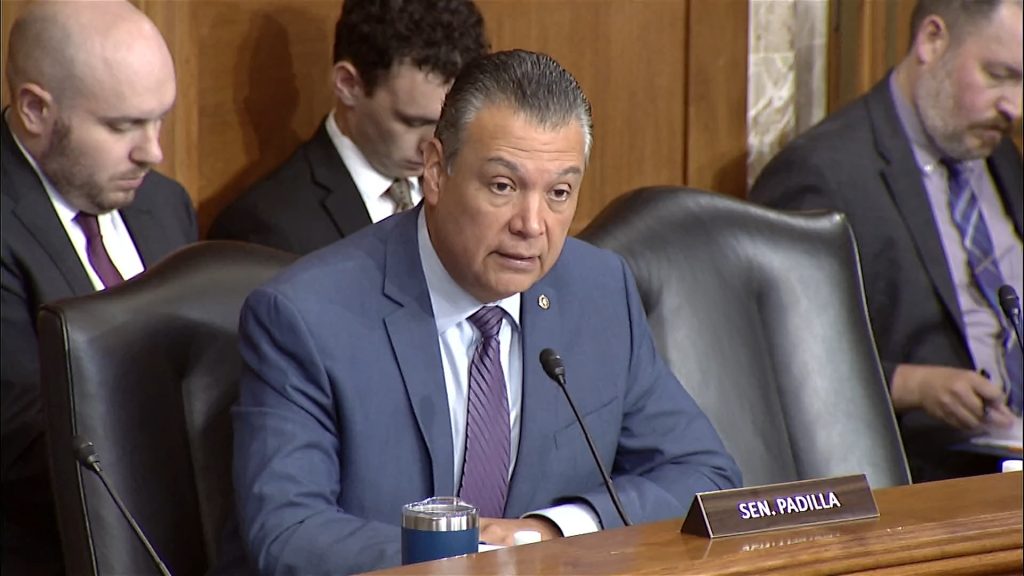Padilla Grills Forest Service Chief on Trump’s Plan to Eliminate State Fire Assistance Funding

WASHINGTON, D.C. — Today, during a Senate Energy and Natural Resources Committee hearing, U.S. Senator Alex Padilla (D-Calif.), co-chair of the bipartisan Senate Wildfire Caucus, pressed U.S. Forest Service Chief Tom Schultz on President Trump’s elimination of all funding for critical state fire assistance programs in his Fiscal Year 2026 budget request. Padilla also warned that the Administration still has not finalized funding assistance for this year ahead of its self-imposed August 15 deadline, risking essential wildfire support that vulnerable communities around the country depend on.
The Forest Service’s State and Private Forestry programs that President Trump is proposing to zero out include state fire assistance, volunteer fire assistance, and the broader state, private, and Tribal forestry initiatives. These programs provide crucial financial and technical support to state and local fire departments for wildland fire prevention, detection, and suppression. Padilla slammed Chief Schultz for the Trump Administration’s delay in disbursing FY25 funding and plan to zero out FY26 funding from these vital fire assistance programs.
- PADILLA: These programs are essential for building and maximizing the capacity in fire-adapted communities and ensuring the safety of first responders during wildfires. What is the status of FY25 funding for these programs? … What’s your confidence level getting the funding out by the August 15 deadline?
- SCHULTZ: Sure. Thank you, sir. So Senator the Fiscal Year 25, we’re still working with OMB on that request, so we’re looking to finalize that here, probably, within the next couple of weeks.
- PADILLA: Look, that worries me. I don’t mean to cut you off. … The deadline to get this out is August 15. We’re a month out, and you’re still finalizing the numbers?
- SCHULTZ: So Q4 numbers for 25 are still being finalized for some of those programs, yes sir.
- PADILLA: That should be a big red flag for all of us. … From past fires in California, including Santa Rosa years ago, Los Angeles, more recently — these are the types of programs that we should be supporting. I asked you about the FY25 numbers. Do you know the FY26 numbers? My understanding is the President’s proposed budget zeroes out this program. How does that make any sense?
- SCHULTZ: So Senator, I think what the intent of that program in ’26 is to transfer that responsibility to the states. That’s the intent of that and then giving that state some heads up that that’s coming.
- PADILLA: Look as every state that I’m aware of is having a tougher budget picture to face, the threat of fires is real. The threat of fires is growing. How does it make sense for the federal government to zero out these programs that you said are so critical?
- SCHULTZ: Sir, we would still be partnering with the states in dialog and discussions, but the transfer–
- PADILLA: But you’re zeroing out their resources. How does that make any sense?
- SCHULTZ: That’s correct. Well, it’s sharing that responsibility and pushing that to the states.
- PADILLA: You’re pushing it to the states that have less resources to work with. How does that make any sense?
- SCHULTZ: In a sense it makes sense because it’s putting that responsibility on the states to make those decisions locally.
- PADILLA: Look, it may be residents of California or Utah, or other states in between: these are all Americans, communities in the United States of America that are at increased risk because of the actions of this Administration which contradict the supposed goals and objectives.
Padilla also warned that the Trump Administration’s mass staffing reductions at the Forest Service will hurt their capacity and capabilities to fight increasing wildfire threats. He condemned Trump’s deployment of National Guard troops to Los Angeles, which diverted them away from critical wildfire response efforts.
- PADILLA: I’m concerned that this represents a significant reduction in capability and capacity and poses a serious danger to communities, not just in California, elsewhere in the West and across the country. The staffing reductions coupled with the President diverting National Guard units in California mean that those resources are no longer available to support our wildfire response capacity. It’s not just irresponsible, it’s dangerous.
Video of Senator Padilla’s full questioning is available here.
More information on the hearing is available here.
In the aftermath of the catastrophic Southern California fires, Senator Padilla has introduced more than 10 bills to help prevent and respond to future wildfires, including the Senate version of the Fix Our Forests Act, bipartisan legislation to combat catastrophic wildfires, restore forest ecosystems, and make federal forest management more efficient and responsive. Padilla highlighted the Senate Fix Our Forests Act after joining federal and state emergency officials for a tour of the Pacific Palisades fire recovery area led by the Federal Emergency Management Agency (FEMA). Padilla and Senator Thom Tillis (R-N.C.) also introduced the FEMA Independence Act, bipartisan legislation to restore FEMA as an independent, cabinet-level agency and improve efficiency in federal emergency response efforts.
###